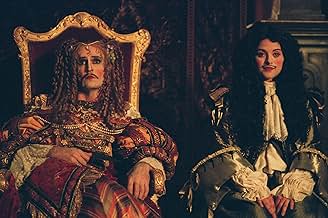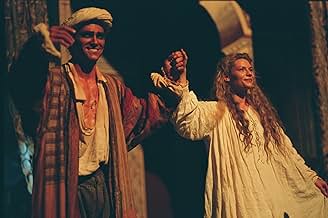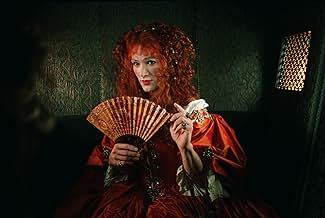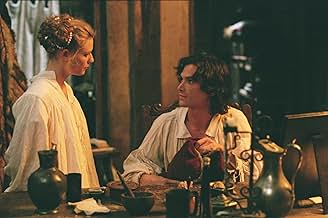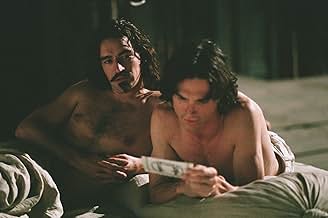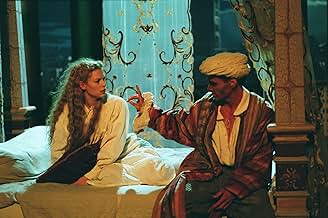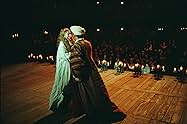CALIFICACIÓN DE IMDb
7.1/10
11 k
TU CALIFICACIÓN
Una vestuarista teatral provoca revuelo al interpretar a Desdémona en el Londres del siglo XVII, dejando dudas sobre el destino del actor que reemplazó.Una vestuarista teatral provoca revuelo al interpretar a Desdémona en el Londres del siglo XVII, dejando dudas sobre el destino del actor que reemplazó.Una vestuarista teatral provoca revuelo al interpretar a Desdémona en el Londres del siglo XVII, dejando dudas sobre el destino del actor que reemplazó.
- Premios
- 4 premios ganados y 1 nominación en total
Opiniones destacadas
He is exquisite, Billy Crudup I mean, but not as a woman. Strangely enough he is more feminine as a man than he is as a woman. Look at him in "Almost Famous" perfect. Shaped like a flamenco dancer, rhythmic, sexual, casually overpowering. In "Jesus's Son" just by waking up at the beginning of the film, he, his character, gets you. Here he seems at odds with the feminine aspect of his character. His Desdemona is a performance. What perhaps I'm saying is that I admired the performance but I didn't feel it. I was aware of its quality but I couldn't taste it, as I have done with previous Billy Crudup creations. Another strange thing, Clare Danes. I think she's one of the most interesting actresses of her generation and here you enjoy her enormously when she's on but her character is now a blurry dot in my memory. What remains most vividly in my mind is Rupert Everett's sensational turn as King Charles. All said and done, try not to miss it.
We sat for the first few minutes wondering whether we'd come to the right film (expecting a formulaic period romp). And for a little while I was prepared to spend the rest of the evening apologising to my partner for the slowness and oddness of the film. But once our disbelief had been suspended and we'd got used to the cramped feeling of the film (more like a staged version than cinematic at times), we both loved it.
I agree that Claire Danes acted well (though the hyperventilation happened once too often) and Billy Crudup brought a complexity to the role that I rarely see in films. The reference to Shakespeare in Love is an affectionate comparison: I enjoyed the light snack of Gwinny, luvvies and Fiennes and have sat through the DVD time and again. But that film had a predictability that Stage Beauty lacked. We didn't know that Stage Beauty's 'love element' would ever work out.
I do not see the development of the relationship between Danes and Crudup as a conversion from gay to straight. Instead I see a problematic progress from an imposed gender identity (perpetuated through sexual fantasy by Buckingham) to an un"knowing" but more satisfying state, where it's being yourself (whatever that is) not performing a role that counts. I think that this is relevant to all of us as we perform the roles that we and those who've influenced our upbringing have created for ourselves. We can't easily escape them (and some are more hammy than others in their performance) but the knowledge that life is performative and complex is, for me, liberating.
And all that from a costume drama!
I agree that Claire Danes acted well (though the hyperventilation happened once too often) and Billy Crudup brought a complexity to the role that I rarely see in films. The reference to Shakespeare in Love is an affectionate comparison: I enjoyed the light snack of Gwinny, luvvies and Fiennes and have sat through the DVD time and again. But that film had a predictability that Stage Beauty lacked. We didn't know that Stage Beauty's 'love element' would ever work out.
I do not see the development of the relationship between Danes and Crudup as a conversion from gay to straight. Instead I see a problematic progress from an imposed gender identity (perpetuated through sexual fantasy by Buckingham) to an un"knowing" but more satisfying state, where it's being yourself (whatever that is) not performing a role that counts. I think that this is relevant to all of us as we perform the roles that we and those who've influenced our upbringing have created for ourselves. We can't easily escape them (and some are more hammy than others in their performance) but the knowledge that life is performative and complex is, for me, liberating.
And all that from a costume drama!
This movie has the blessing of the flawless direction of Richard Eyre, who knows a lot about kings and queens. The screen play is adapted by the author of the play, Jeffrey Hatcher. Surprisingly, these two men have been able to create a film that is not only visually satisfying, but it also is an adult entertainment.
This movie gives us a glimpse of how theatre functioned in England up to the times of Charles II. The female roles of all plays were portrayed by male actors. The school of acting in that era was an artificial one where actors relied in gestures and affectations that would be laughable today in a serious drama, but that was the way it was the accepted Method then, nothing to do with Stanivslaski, or Strassberg.
The leading figure of that theatrical world was Ned Keynaston, who was the most famous Desdemona of his time. There must have been a lot of gay men that were attracted to that world, as was the case with Mr. Keynaston, who might have been bisexual, although that comes as a secondary subplot. This actor is greatly admired by all, including the dressing assistant, Maria. This girl loved to be in the theatre, but could not, because only men were allowed. So instead, she goes to a second rate company that puts on plays in a pub and emerges as Margaret Hughes, an actress in her own right who will challenge Keynaston's Desdemona and makes that role, her signature role as well.
Claire Danes, as Maria, or Margaret Hughes, has never been better! She shines as the girl whose ambition is to be on stage. She is wonderful in the part. Ned, played with gusto by Billy Crudup, shows an unexpected range, although he has done theatre extensively. Both of these actors takes us back to London and make us believe that what we are watching.
A glorious English cast behind the two American principals are gathered to play effortlessly the theatrical figures of the time, and also the King and his court. Ruper Everett, as King Charles II, is hilarious. The scene in which he plays in drag with his mistress, Nell Gwynn, is one of the best things of the movie. Also, Richard Griffith, as lecherous Sir Charles Sedley, gives a stellar performance. Ben Chaplin, as the Duke of Buckingham, reveals the ambiguity of the men that were attracted to those early thespians.
Thoroughly enjoyable because of Richard Eyre's direction and eye for detail.
This movie gives us a glimpse of how theatre functioned in England up to the times of Charles II. The female roles of all plays were portrayed by male actors. The school of acting in that era was an artificial one where actors relied in gestures and affectations that would be laughable today in a serious drama, but that was the way it was the accepted Method then, nothing to do with Stanivslaski, or Strassberg.
The leading figure of that theatrical world was Ned Keynaston, who was the most famous Desdemona of his time. There must have been a lot of gay men that were attracted to that world, as was the case with Mr. Keynaston, who might have been bisexual, although that comes as a secondary subplot. This actor is greatly admired by all, including the dressing assistant, Maria. This girl loved to be in the theatre, but could not, because only men were allowed. So instead, she goes to a second rate company that puts on plays in a pub and emerges as Margaret Hughes, an actress in her own right who will challenge Keynaston's Desdemona and makes that role, her signature role as well.
Claire Danes, as Maria, or Margaret Hughes, has never been better! She shines as the girl whose ambition is to be on stage. She is wonderful in the part. Ned, played with gusto by Billy Crudup, shows an unexpected range, although he has done theatre extensively. Both of these actors takes us back to London and make us believe that what we are watching.
A glorious English cast behind the two American principals are gathered to play effortlessly the theatrical figures of the time, and also the King and his court. Ruper Everett, as King Charles II, is hilarious. The scene in which he plays in drag with his mistress, Nell Gwynn, is one of the best things of the movie. Also, Richard Griffith, as lecherous Sir Charles Sedley, gives a stellar performance. Ben Chaplin, as the Duke of Buckingham, reveals the ambiguity of the men that were attracted to those early thespians.
Thoroughly enjoyable because of Richard Eyre's direction and eye for detail.
This film came and went in the cinema I go to. I went to see it on the last day it was on (which really wasn't very long at all) and I absolutely loved it. I don't think this film got the praise that it deserved. Billy Crudup has the perfect face for a Stage Beauty - he is effeminate in costume, yet a stunning man without the visage he dons for his Desdemona. Claire Danes pulls off her part wonderfully, especially the scene after she 'rescues' Crudup from the tavern, and the final rehearsal scene for Othello. Rupert Everett plays a wonderfully divine King Charles (with his little spaniels) and Zoe Tapper plays the ex-orange seller to perfection. The comedy and more emotional scenes in the play combine brilliantly. Bravo to all involved in this truly great film. If you didn't get the chance to see it in the cinema, I certainly recommend you to go out and rent it!
I had heard of the film through tadbloid and celebrity headlines of how Billy Crudup left his seven month pregnant girlfriend, Mary-Louise Parker, for Claire Danes. I wasn't interested in the film, but then my sister got the DVD for her birthday. I saw it for the first time over the week and I have been watching it over and over again. What a beautifully written story about acting, gender, theater, illusion, romance, and discovery of one's own identity. During the Restoration of England under the reign of King Charles II, women were finally given the freedom and right to perform on the stage whereas before the decree it was illegal and obscene for a woman to perform on stage.
Ned Kynaston (Billy Crudup) is the greatest actor and the most beautiful "woman" of the English stage. He played several women's part and his most famous is the role of Desdemona in William Shakespeare's Othello. He is studied, admired, loved, and envied by his dress keeper, Maria (Claire Danes). She watches from the wings and longs to act and she does so behind Kynaston's back and in low pubs before a royal official, the Duke of Buckingham (Ben Chaplin). Then the chain of events unfold as Maria is introduced to Charles II (Rupert Everett) and his mistress Nell Gwyn (Zoe Tapper) who then declares that women will be given the freedom to perform in theater.
As Maria's fame rises and women are playing more and more of the female roles, Ned Kynaston (the last of his kind of actors) is casted aside. As an actor and as man, Kynaston had learned to suppress all masculinity in order to gain the grace and beauty of a woman. He knows only how to portray women and he is lost in learning to play male roles. But then again Maria is unable to play the role of Desdemona as a real woman. Both Kynaston and Maria fall in love and into passion as they learn from each other their own sexual identities and to channel their femininity and masculinity.
I fell in love with the film's story and with the performances of Billy Crudup and Claire Danes. As Kynaston, Crudup reveals vulnerability and strength as a man who discovers himself as a man (and a very hot one at that) through the role and eyes of being a woman. As Maria, Danes is beautiful and real: those tears are real! She can cry on cue and with the heartbreak of a real woman in love and envious of the man she loves. Maria is a strong, forthcoming, and in way a modern actress ahead of her time. She is not an "Eve" from All About Eve, she is a Viola Delesop from Shakespeare In Love, but real. The love scene between Danes and Crudup is sexy, tender, and passionate showing that explicit sex and nudity is not always necessary. They look into each other's sides and truly learn from each other as man and woman.
This is a highly recommended film for those who love acting, period pieces, or just if you want to see a really good film, "Stage Beauty" is very much the film to watch.
Ned Kynaston (Billy Crudup) is the greatest actor and the most beautiful "woman" of the English stage. He played several women's part and his most famous is the role of Desdemona in William Shakespeare's Othello. He is studied, admired, loved, and envied by his dress keeper, Maria (Claire Danes). She watches from the wings and longs to act and she does so behind Kynaston's back and in low pubs before a royal official, the Duke of Buckingham (Ben Chaplin). Then the chain of events unfold as Maria is introduced to Charles II (Rupert Everett) and his mistress Nell Gwyn (Zoe Tapper) who then declares that women will be given the freedom to perform in theater.
As Maria's fame rises and women are playing more and more of the female roles, Ned Kynaston (the last of his kind of actors) is casted aside. As an actor and as man, Kynaston had learned to suppress all masculinity in order to gain the grace and beauty of a woman. He knows only how to portray women and he is lost in learning to play male roles. But then again Maria is unable to play the role of Desdemona as a real woman. Both Kynaston and Maria fall in love and into passion as they learn from each other their own sexual identities and to channel their femininity and masculinity.
I fell in love with the film's story and with the performances of Billy Crudup and Claire Danes. As Kynaston, Crudup reveals vulnerability and strength as a man who discovers himself as a man (and a very hot one at that) through the role and eyes of being a woman. As Maria, Danes is beautiful and real: those tears are real! She can cry on cue and with the heartbreak of a real woman in love and envious of the man she loves. Maria is a strong, forthcoming, and in way a modern actress ahead of her time. She is not an "Eve" from All About Eve, she is a Viola Delesop from Shakespeare In Love, but real. The love scene between Danes and Crudup is sexy, tender, and passionate showing that explicit sex and nudity is not always necessary. They look into each other's sides and truly learn from each other as man and woman.
This is a highly recommended film for those who love acting, period pieces, or just if you want to see a really good film, "Stage Beauty" is very much the film to watch.
¿Sabías que…?
- TriviaClaire Danes and Billy Crudup became a couple after the filming of this movie. Crudup left his long-time girlfriend Mary-Louise Parker for Danes.
- ErroresNed Kynaston, age 20-something, says that he's been playing women on stage for half his life, since he was a child. But at the royal banquet, the King says that the theatres have only recently reopened after an 18-year shutdown caused by the Puritan takeover.
- Citas
King Charles II: Why shouldn't we have women on stage? After all, the French have been doing it for years.
Sir Edward Hyde: Whenever we're about to do something truly horrible, we always say that the French have been doing it for years.
Selecciones populares
Inicia sesión para calificar y agrega a la lista de videos para obtener recomendaciones personalizadas
- How long is Stage Beauty?Con tecnología de Alexa
Detalles
- Fecha de lanzamiento
- Países de origen
- Sitios oficiales
- Idioma
- También se conoce como
- Compleat Female Stage Beauty
- Locaciones de filmación
- Productoras
- Ver más créditos de la compañía en IMDbPro
Taquilla
- Total en EE. UU. y Canadá
- USD 782,383
- Fin de semana de estreno en EE. UU. y Canadá
- USD 38,654
- 10 oct 2004
- Total a nivel mundial
- USD 2,307,092
- Tiempo de ejecución
- 1h 46min(106 min)
- Mezcla de sonido
- Relación de aspecto
- 2.35 : 1
Contribuir a esta página
Sugiere una edición o agrega el contenido que falta



